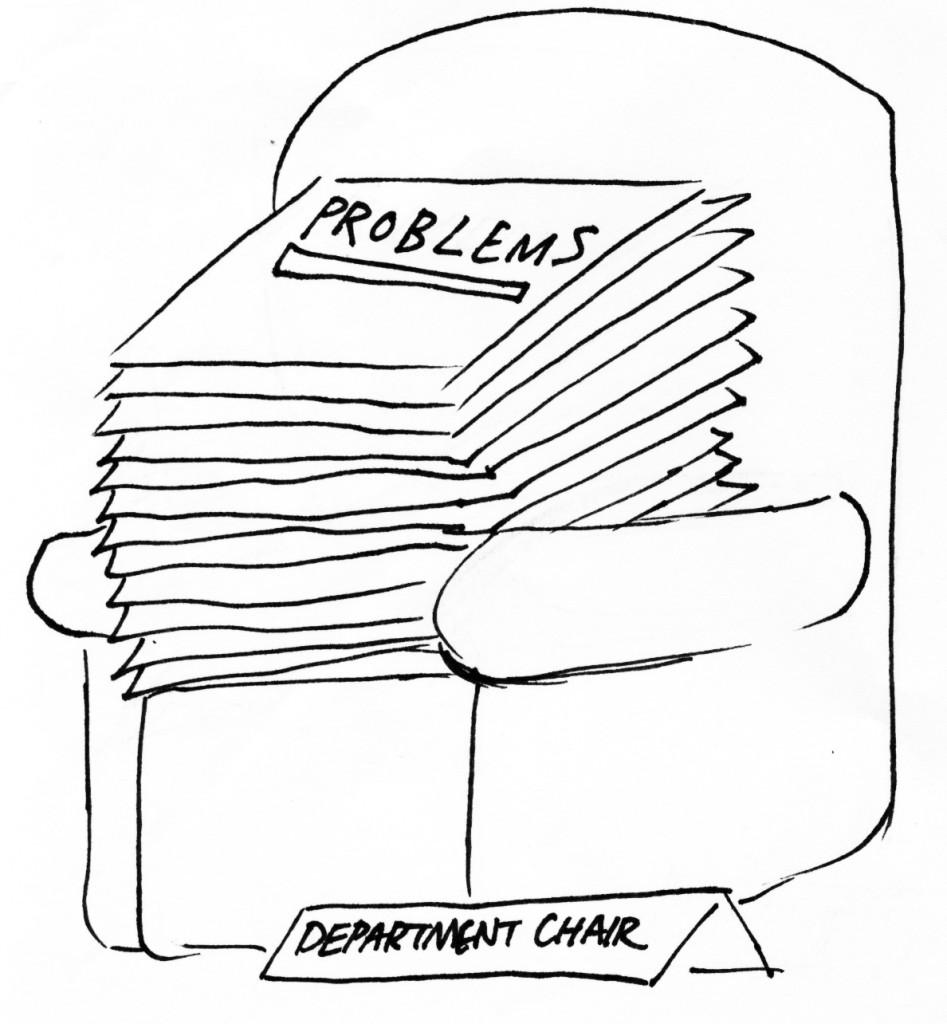As a result of budget cuts from last school year, Ladue does not have department chairs. Previously, each department had a designated chair to serve as the department’s leader, who coordinates schedules and manages the budget.
“[Department chairs] manage the budget, coordinate the schedule, serve as an advocate for their department to the administration, and address the specific needs of their department,” former science department chair Jesse McGlaughlin said. “They also play a significant role in communication and maintaining a positive environment in their department.”
Because of their extra responsibilities within their department, department chairs received certain compensations in the form of an extra period of preparation.
“All teachers teach five classes with two prep periods and an academic lab,” principal Bridget Hermann said. “Chairs [used to] teach four classes with an extra prep period to take care of department duties.”
However, budget cuts last year necessitated that all teachers teach five classes, which resulted in a change in this compensation. Instead of the preparation period, department chairs would have been given a monetary stipend.
“We didn’t want to make the cuts, but we had to,” Hermann said. “In order to maintain smaller class sizes, we wanted chairs to teach five classes, instead compensating them with a $2000 stipend.”
These changes prompted dissatisfaction from the former department chairs. They felt that the extra preparation hour was important to their work and that demands of their job would be unreasonable without it.
“When you think about it, if you teach four classes and do department duties in your fifth hour, then the departmental work constitutes one fifth of your work,” German teacher and former foreign language department chair Deborah Lund said. “Our departmental hour was crucial. There is an enormous amount of work. To take away my hour and insist that I do my departmental duties and to prepare for all my classes was unreasonable.”
The teachers had different reasons for their discontent. Some felt that the money offered was not enough to compensate for the work, while others believed that they could not handle the workload without the extra hour.
“Some teachers were offended by the money offered,” Lund said. “In other cases it was about the actual feasibility; is it even possible to take on the departmental duties in addition to a full teaching load?”
Regardless of their reasons, the response of the department chairs was collectively negative. They believed that the stipend was disproportional to the workload of their position.
“It was almost unanimous among the chairs that the amount of work required merited more than the stipend,” McGlaughlin said.
As a result of the policy changes, the department chairs resigned. Despite the preference of both teachers and administrators to have department chairs in place, no one has filled their positions.
“I want department chairs,” Hermann said. “Teachers have asked about the position, and I’ve said that if they want to have them, I’m willing.”
This void has affected many differences in the structure and function of the departments. For example, some teachers have witnessed a decrease in organization and communication.
“It feels almost directionless because there is a lack of leadership,” McGlaughlin said. “It’s tougher to put forth curriculum changes, there’s been a loss of communication in the department, and some things are just not being done.”
These changes, however, are less apparent to students. Although many students are aware of the many responsibilities of department chairs, few have noticed their absence.
“I didn’t notice any differences [after the department chairs resigned],” junior Sydney Petersen said. “I didn’t even know there weren’t department chairs anymore.”
The lack of department chairs do not seem to be noticeably affecting students, which comforts Hermann, who wishes to maintain a high level of education in the school.
“I don’t think this has affected students very much,” Hermann said, “which is a huge relief for me.”
However, students still realize how no department chairs could be a source of difficulty to the teachers and departments. They understand the duties that teachers possess require huge amounts of work and dedication.
“I think that it would take a lot of commitment to be a department chair,” senior Sarabjeet Seehra said. “Not only do they have to teach, but they also have obligations associated with the position.”
To compensate for the lack of department chairs, the school has instituted changes in the departmental structure. New groups of teachers have been formed to try and maintain communication throughout the school.
“There’s a leadership team and other committees to help address the needs of teachers,” Hermann said.
In order to help alleviate the new pressures on the teachers from the lack of chairs, the school has also hired a Department Chair Coordinator, Tony Taylor. He helps manage the purchasing and day-to-day business of buying materials in departments.
“Most of the things I help with involve ordering textbooks and supplies,” Taylor said. “Right now, we’re filling in textbooks in classes without enough and making sure that teachers have everything they need, from office supplies to instructional aids.”
Teachers had to adjust to the changes. However, despite their dissatisfaction with the changes, the teachers realize the difficulties the administration faces when dealing with budget cuts.
“It is a complicated problem,” Lund said. “We understand that the district is under constraints to save money, but at the same time must maintain the quality of education for students. The district was really stuck between a rock and a hard place.”
The lack of department chairs is not optimal for any of the educators. Typically, department chairs serve as facilitators of communication to the administration and within the department.
“Most schools have department chairs because they serve a purpose as an organizational tool,” Hermann said. “They help work through the issues in their departments and the school as a whole. They provide leadership for their department and assist with school leadership. We’ve done okay without them, but I think we could operate better with department chairs.” #











